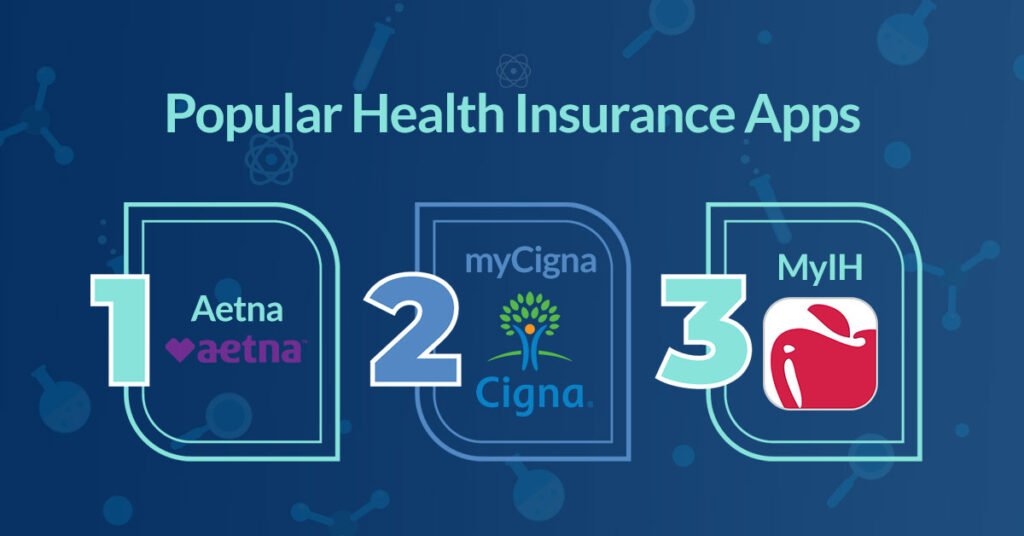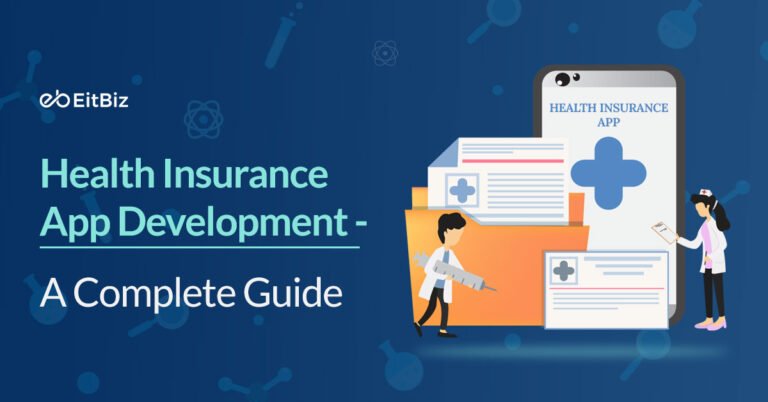Before you need clarification about whether to embark on this health insurance app development journey, ask yourself!
How many of your friends or relatives currently have health insurance?
Well, you’ve got the answer in your mind! Undoubtedly, a majority of individuals don’t have health insurance!
Let’s move ahead with stats!
- The nonelderly adults (between 18 to 64) reported they don’t have health insurance. The reason behind this is the higher cost of health insurance (70%), failing to meet eligibility criteria (more than 26%), and not requiring any health insurance (more than 23%).
- More than 8% of Americans did not have health insurance two years ago (2022).
- More than 41% reported that they are having debt from unpaid medical bills.
This is where the importance of health insurance app development comes in!
Since people are shifting to online platforms to buy products, leveraging the right tech to build a solid app is quintessential!
Building a health insurance app with built-in features and seamless in-app navigation will position your business for success.
Are you excited to build the “GOAT” health insurance app of all time? Let’s dive in!
Understanding a Health Insurance App
In layman’s language, a health insurance app is a mobile app that offers a comprehensive solution for individuals looking to insure their health in case of a medical emergency. From renewal reminders and details of network hospitals to hassle-free claim payments, users can perform abundant tasks via an app. Furthermore, a dedicated medical app enables customers to renew their policies, make claims, contact customer care, and more.
Though an app is incredibly good for customers, it is also a win-win situation for businesses, as well. They can build a dedicated health insurance app to attract their audience, provide them customer support, and ultimately, boost revenue.
Did you know?
The market size of health insurance is expected to surpass US$2.38tn in 2024.
Well, that’s how big the market is!
Now you’ve got a quick idea of a health insurance app and its importance, it’s time to unwrap its crucial benefits.
Potential Reasons to Build a Health Insurance App for Customers

- Plan Selection
Planning to buy good health insurance is a potential challenge for users. They find it difficult to trust even if they decide on one. Thus, having a good app is important in such a case as it streamlines the search to display the “most viewed” or “frequently bought” plans to the customers. With abundant options available, customers can easily find a medical plan and make a purchase.
- Hassle-Free Claim Processing
One of the important aspects of a health insurance policy is filing a claim. No matter how good your customer’s policy is, if they don’t know how to claim, it’s a complete waste. However, with a dedicated app, customers may have access to essential data to effortlessly file a claim without asking anyone for assistance. Moreover, it will help avoid unnecessary claim rejections that occur due to incorrect information or late filing of claims.
- Minimizing paperwork
Be it filing claims or buying or renewing a medical policy, customers don’t like collecting and storing bunches of paper in their homes. Nobody has enough time to store the paper properly. However, an app eliminates the need for physical forms or documentation to proceed with the policy-buying process. When your customers have an app, they can easily perform abundant tasks without the need to visit the branch.
- Reducing errors
Gone are the days when staff used to manage a pile of customers’ policy documents. Thanks to digital development, customers can now use apps to manage their policies online. Also, manual management often leads to errors in typing names, policy duration, addresses, and whatnot. Since the monotonous tasks are delegated to AI-powered apps, there’s no room for potential errors.
- Continuous Communication and Support
One of the biggest benefits of a health insurance app is that it fosters quick, convenient, and error-free communication between insurers, doctors, and policyholders. Besides, these apps are pre-equipped with integrated chatbots that offer round-the-clock assistance to customers’ queries. No matter what time of the day, customers can easily resolve their issues promptly.
- Maximizing ROI
Since these health insurance apps are designed to perform repetitive tasks with ease, there’s less demand for human assistance. Incorporating cutting-edge technologies like Artificial Intelligence (AI) and Machine Learning (ML) can automate the process and prevent human-centric errors.
Thus, it allows organizations to save upfront expenses which they would have spent on administrative costs. Consequently, it helps insurance businesses to grow their overall revenue.
- Customer Engagement
Remember that customers will likely retain when they receive higher standards of assistance and convenience. Even if your app’s design is satisfactory but offers quick assistance, then they will continue using your solution for more time. A user-friendly app is an important factor in deciding the level of customer satisfaction. Furthermore, not only in terms of customer engagement but it also helps nurture leads and grow your client base.
So, that’s the incredible benefits of building a health insurance app for your customers!
Now, you know its benefits, right?
But customers can only reap benefits if they find the right set of features in your app! This brings us to the next milestone wherein we’ll discuss the top features to include in health insurance app development!

Top Features to Include in Health Insurance App Development
1. User Profile Management
Including the profile management feature will collect vital information about a customer. It contains user details like name, age, height, and body mass. With this feature, customers can access their insurance ID cards and review their policy details.
2. Locating Healthcare Providers
It is no secret that insurance companies have strong relationships with clinics, hospitals, and medical stores. Integrating this feature will display a wide network on the app that enables customers to enjoy hassle-free access.
3. Policy Management
Including such a feature will allow the customers to review, change, or even cancel their current medical policy. Furthermore, it allows users to easily switch to a different insurance provider that has the best health insurance plan to offer.
4. Renewal or Purchase of Policies
Here comes the important part of the app! No matter what kind of app you build, ensure you add the feature of renewal or purchase of policies. Thus, it helps users to perform transactions for their health insurance policies. The best part is that they don’t need to visit any branch to get these tasks done.
5. Document Upload/Storage
Today’s customer doesn’t have time to physically visit the branch and upload their policy documents. Incorporating the document upload/storage feature will upload and store crucial documents like medical prescriptions, medical reports, and claim-related papers.
6. Secure Payment Gateway
No matter where your customers are, nobody wants to run into fraud while making payments. Ensure you implement stringent security measures into the app so that customers stay safe and feel protected while using your app.
7. Personalized Dashboard
It even serves as a game-changing feature that can boost the growth of your app. Adding a personalized dashboard in the app includes the vital details of the customers. These include name, address, sum insured, deductibles, copayment, number of people insured, additional benefits, and more.
8. Push Notifications
If you’re about to run discounts or provide special offers to your customers, keep them aware via “Push Notifications”. The alerts may include claim status updates, renewal dates, health tips, promotional discounts, and more. Furthermore, incorporating such features will help businesses to generate qualified leads.
9. Claims Management
The second last feature to include in your health insurance is none other than “claims management”. With such a valuable feature, users can submit, track, and manage insurance claims. Additionally, customers can effortlessly upload documents related to claims via their smartphone/desktop.
10. Effective Communication
Among all features, if your customers face difficulty in contacting their insurance provider, then all your efforts may go in vain. Implement robust and convenient communication methods like Chatbots, Video Calls, Voice Calls, Email, WhatsApp, and more. Remember that providing robust and quick customer support will bring credibility to the business and make your app go “Viral” among your target audience.
Now, you know the features to include in your health insurance app!
But the question is still intact- How to build a Health Insurance App?
Without further ado, let’s get started!

Steps to Build a Scalable Health Insurance App
Since health insurance app development may reap countless business benefits, it’s time to know the steps involved!
Step 1: Research & Planning
Before you run into choosing technologies and app developers, you should focus on exploring the project workflow. Just ask yourself: Why are you doing so? What is your purpose behind building such an app?
With a systematic roadmap, you will likely build a solid, scalable, and feature-rich app. When you have a strong reason behind app development, you’ll know what to choose the right platform (iOS or Android).
Step 2: Understanding the Competition
Once you have prepared your mind, you should focus on building a solid health app that stands out. Ensure your healthcare app provides the latest insurance products to offer a seamless and consistent experience to customers. Furthermore, you may hire a professional healthcare app development company to embrace interactive platforms to connect with your customers.
Step 3: Choosing the Tech Stack
No matter how solid your app development thought is, you’ll fall behind the competition if you don’t have the latest tech stack. Remember that selecting technologies is not just about choosing a mobile app framework. Additionally, you should consider languages, libraries, development toolkits, programming methods, and more.
It is no secret that choosing the right tech stack is important for the success of your health app. If you don’t have the time or expertise to do it, hiring the best healthcare app development company is a must!
Step 4: Designing the Experience
After you’re done with the selection of the right tech stack, it’s time to focus on the UX/UI design. While developing your healthcare app, you cannot overlook the importance of UX/UI. Remember that good app design must engagingly convey your products. Before you finally launch your app, build a prototype that identifies errors and eliminates gaps to foster a seamless user experience.
Furthermore, a prototype will have you build an app for different screen resolutions.
Step 5: Building Codebases (Frontend & Backend)
Here comes the important part of app development! Building codebases is one of the important aspects to consider. Before we dive into codebases, let’s divide into three phases;
- Frontend development
This aspect focuses on building the app’s user interface and admin panels for smartphone products. Ensure you leverage high-end front-end development technologies like Angular, React.js, and Vue.js.
- Backend development
This aspect focuses on the data processing, storage, and security of the app. Though these tasks work in the backend, they play an incredibly important role in enhancing the app’s functionality. Ensure you consider backend languages such as PHP, Node.js, and Java.
- Mobile app development
Finally, it covers the app creation and integration of backend endpoints. When it comes to building cross-platform apps, Flutter and React Native while Kotlin and Swift are an ideal option for building native apps.
Step 6: Testing & Launch
This is the final step and decides the success of your healthcare app. In this phase, hire professional QA testers to conduct a series of automated/manual tests before the final deployment. It’s important to conduct rigorous testing of the app before you launch it across app stores (Android and iOS). Even after that, your job doesn’t end here! After deployment, post-maintenance is important to keep your app updated and stay ahead of the competition.
Examples of Popular Health Insurance Apps

1. Aetna
Developed by Aetna Life Insurance Company, Aetna is a leading health insurance application that allows users to easily find a doctor and treat their illnesses. Furthermore, the app allows users to manage claims, retrieve their information, and communicate with their preferred doctor.
2. myCigna
Did you know? There are more than 1M+ downloads of the app to date. Furthermore, the app allows its users to file claims and track their medical expenses. The best thing about the software app is that it allows users to access their medical information.
3. MyIH
Another leading app that made its way into the list is MyIH! It is a free health insurance app that provides individual and family health insurance services. Furthermore, it allows users to connect with doctors, hospitals, and clinics to get medical assistance.
Final Thoughts
So, that’s a wrap to the guide to health insurance app development! There is no denying that a dedicated health insurance app may allow users to explore a wide range of insurance options and choose one that suits their needs.
Planning to build a solid health insurance app? If so, your search ends here!
EitBiz is a leading health insurance app development company that creates a diverse range of applications across industries such as healthcare, fintech, manufacturing, and supply chain. Backed by 15+ years of industry experience, we ensure the successful delivery of high-quality health insurance apps.
Ready to build an insurance app to reap countless business benefits? If so, contact us Call us at +1(812)530-6300 or email us at info@eitbiz.com for healthcare solution development services and start your project now!







